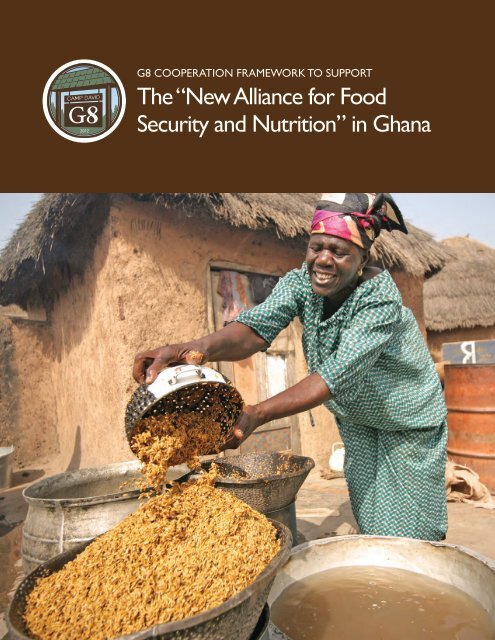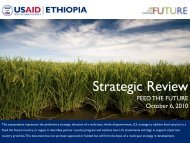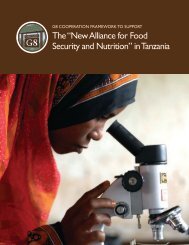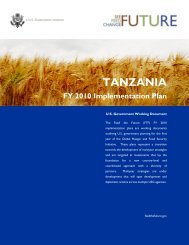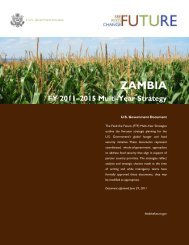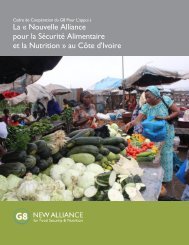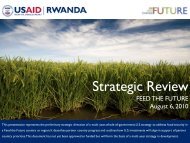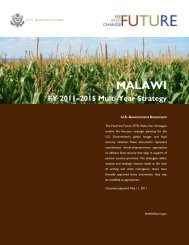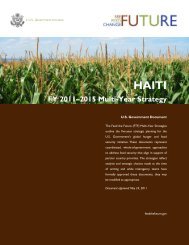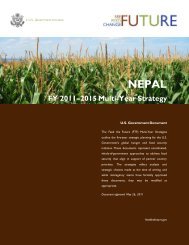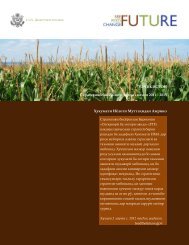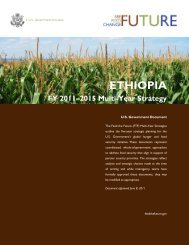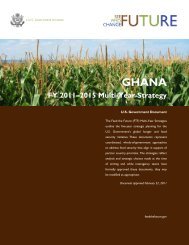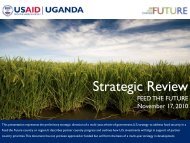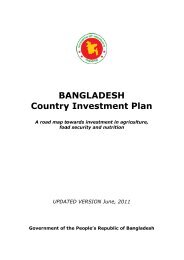Ghana_web.pdf - Feed the Future
Ghana_web.pdf - Feed the Future
Ghana_web.pdf - Feed the Future
Create successful ePaper yourself
Turn your PDF publications into a flip-book with our unique Google optimized e-Paper software.
G8 Cooperation framework to support<br />
The “New Alliance for Food<br />
Security and Nutrition” in <strong>Ghana</strong>
G8 Cooperation Framework to Support <strong>the</strong><br />
“New Alliance for Food Security and Nutrition” in <strong>Ghana</strong><br />
Three years after <strong>the</strong> G8 Summit at L’Aquila, Italy, <strong>the</strong> international community recognizes <strong>the</strong><br />
importance of food security to development, inclusive economic growth and <strong>the</strong> dignity of all<br />
women and men. In that spirit, we welcome <strong>the</strong> success of <strong>the</strong> Comprehensive Africa<br />
Agriculture Development Program (CAADP) in demonstrating African ownership and leadership,<br />
its call for expanded public and private investment in agriculture and desire to build on <strong>the</strong><br />
progress that African governments have made in advancing a vision for agricultural<br />
development in Africa.<br />
<strong>Ghana</strong> is making great strides in public-private partnership in agricultural growth, exemplified<br />
by <strong>the</strong> development of its <strong>Ghana</strong> Commercial Agriculture Program. This strategic investment<br />
blueprint is a model for inclusive and strategic collaboration among government, donors and<br />
<strong>the</strong> private sector. Toge<strong>the</strong>r, <strong>the</strong> Government of <strong>Ghana</strong> and <strong>the</strong> G8 members, commit to <strong>the</strong><br />
“New Alliance for Food Security and Nutrition” and to working toge<strong>the</strong>r to generate greater<br />
private investment in agricultural development, scale innovation, achieve sustainable food<br />
security outcomes, reduce poverty and end hunger. As partners, we commit ourselves to <strong>the</strong><br />
following principles and actions:<br />
Support of CAADP Country Compacts<br />
The G8 members, consistent with commitments made at L’Aquila, reaffirm <strong>the</strong>ir intention to<br />
align <strong>the</strong>ir agricultural financial and technical support with <strong>the</strong> priorities of <strong>the</strong> CAADP National<br />
Investment Plan for Agriculture and Food Security (referred to in <strong>Ghana</strong> as <strong>the</strong> Medium Term<br />
Agriculture Sector Investment Plan or METASIP), in such a manner as to accelerate<br />
implementation of <strong>the</strong> METASIP and in conjunction with commitments made by <strong>the</strong><br />
Government of <strong>Ghana</strong>. Consistent with <strong>the</strong> foregoing, <strong>the</strong> G8 members recognize <strong>the</strong> value of<br />
predictability of donor activities including financial and technical support over a sustained<br />
period of time, as set out in Annex 2.<br />
The G8 members intend to provide support within <strong>the</strong> agriculture sector to accelerate<br />
implementation of <strong>the</strong> METASIP, including through <strong>the</strong> Grow Africa platform, with <strong>the</strong> overall<br />
goal of facilitating increases in private investment and scaling innovation. The G8 members<br />
intend to engage <strong>the</strong> relevant agencies of <strong>the</strong>ir member governments and also to bring to bear<br />
appropriate enabling actions to accelerate progress in <strong>the</strong> areas of finance and markets, science<br />
and technology, and risk management. To address <strong>the</strong> underlying causes of food insecurity, <strong>the</strong><br />
G8 members intend to focus key resources and o<strong>the</strong>r contributions on high-priority, highimpact<br />
investments within <strong>the</strong> METASIP and in particular on <strong>the</strong> development of <strong>the</strong><br />
1
Government of <strong>Ghana</strong>’s priority area of <strong>the</strong> Savannah Accelerated Development Authority<br />
region of nor<strong>the</strong>rn <strong>Ghana</strong> and o<strong>the</strong>r deprived areas.<br />
Key Policy Commitments<br />
The Government of <strong>Ghana</strong> intends to pursue <strong>the</strong> policy goals set out below in order to build<br />
domestic and international private sector confidence to increase agricultural investment<br />
significantly, with <strong>the</strong> overall goal of reducing poverty and ending hunger.<br />
The Government of <strong>Ghana</strong> intends to improve incentives for private sector investment in<br />
agriculture, in particular, taking actions to facilitate inclusive access to and productive use of<br />
land; developing and implementing domestic seed regulations that encourage increased private<br />
sector involvement in this area; and supporting transparent inclusive, evidence-based policy<br />
formulation (see Annex 1).<br />
The Government of <strong>Ghana</strong> reaffirms its intention to provide <strong>the</strong> human and financial resources<br />
and <strong>the</strong> mechanisms for dialogue with <strong>the</strong> private sector, farmers and o<strong>the</strong>r stakeholders, and<br />
across government ministries that are required for <strong>the</strong> achievement of tangible and sustainable<br />
outcomes, <strong>the</strong> acceleration of <strong>Ghana</strong>’s development, and <strong>the</strong> delivery of tangible benefits to<br />
smallholder farmers, including women.<br />
The Government of <strong>Ghana</strong> reaffirms its commitment to mainstream nutrition in all food<br />
security and agriculture-related programs.<br />
Private Sector Engagement<br />
Private sector representatives have communicated that <strong>the</strong>y intend to invest in <strong>the</strong> agriculture<br />
sector in <strong>Ghana</strong> in support of <strong>the</strong> CAADP National Investment Plan for Agriculture and Food<br />
Security (<strong>the</strong> METASIP), through in Letters of Intent that <strong>the</strong>y will prepare and execute, and<br />
intend to advise, shape, and participate in broad, inclusive and sustained private sector<br />
consultative mechanisms with <strong>the</strong> host government (see Annex 3).<br />
Shared Responsibilities<br />
The G8 members, <strong>the</strong> Government of <strong>Ghana</strong> and <strong>the</strong> private sector, confirm <strong>the</strong>ir intention to<br />
take account of <strong>the</strong> Voluntary Guidelines on <strong>the</strong> Responsible Governance of Tenure of Land,<br />
Fisheries and Forests in <strong>the</strong> Context of National Food Security (“<strong>the</strong> Voluntary Guidelines”)<br />
adopted by <strong>the</strong> Committee on World Food Security in May 2012, as well as <strong>the</strong> Principles of<br />
Responsible Agricultural Investment (PRAI) produced by several international organizations and<br />
endorsed by among o<strong>the</strong>rs, <strong>the</strong> G8 and G20, which are undergoing a consultative process<br />
through <strong>the</strong> Committee on World Food Security on PRAI. In addition, <strong>the</strong>y intend to work<br />
2
toge<strong>the</strong>r specifically to develop pilot implementation programs for <strong>the</strong> Voluntary Guidelines<br />
and <strong>the</strong> PRAI in <strong>Ghana</strong>.<br />
Coordination and Collaboration<br />
Recognizing existing arrangements for division of labor between <strong>the</strong> Government of <strong>Ghana</strong> and<br />
development partners, G8 members intend to coordinate <strong>the</strong>ir efforts with <strong>the</strong> aim of attaining<br />
greater effectiveness. The co-chair of <strong>the</strong> <strong>Ghana</strong> agriculture sector working group (currently<br />
<strong>the</strong> Government of <strong>the</strong> United States of America) intends to serve as a lead interlocutor with<br />
<strong>the</strong> host country, private sector, and o<strong>the</strong>r stakeholders on behalf of <strong>the</strong> G8, working through<br />
existing in-country consultation groups and structures 1 without setting up parallel or duplicative<br />
structures. The G8 and Government of <strong>Ghana</strong> welcome <strong>the</strong> participation of o<strong>the</strong>r countries and<br />
partners.<br />
Results<br />
Consistent with <strong>the</strong> New Alliance goal of improving food security and nutritional status by<br />
helping 50 million people in sub-Saharan Africa emerge from poverty by 2022, <strong>the</strong> participants<br />
intend <strong>the</strong>ir combined actions in <strong>Ghana</strong> to help 1.3 million people emerge from poverty.<br />
Mutual Accountability<br />
The G8 members, <strong>the</strong> Government of <strong>Ghana</strong>, and <strong>the</strong> private sector intend to review <strong>the</strong>ir<br />
performance under this document through an annual review process to be conducted within<br />
<strong>the</strong> existing broader CAADP-donor Joint Sector Review of METASIP implementation. These<br />
participants intend, in particular, to review progress toward jointly determined objectives on<br />
<strong>the</strong> basis of jointly determined benchmarks in contributing to fulfillment of <strong>Ghana</strong>’s CAADP<br />
investment plan: 2 (1) progress towards achieving <strong>the</strong> poverty reduction target; (2) G8 member<br />
commitments to align <strong>the</strong>ir agricultural investments to <strong>the</strong> Government of <strong>Ghana</strong>’s METASIP;<br />
(3) Government of <strong>Ghana</strong>’s progress in implementing its policy commitments and consulting<br />
with private-sector investors; and (4) <strong>the</strong> investment commitments of private-sector investors.<br />
The review will also take account of <strong>the</strong> shared responsibilities related to <strong>the</strong> Voluntary<br />
Guidelines and <strong>the</strong> PRAI.<br />
1 This includes <strong>the</strong> National Development Planning Deprived Areas Working Group and <strong>the</strong> Savannah<br />
Accelerated Development Authority (SADA), set up to coordinate and accelerate development in <strong>the</strong><br />
North of <strong>Ghana</strong>.<br />
2 Including o<strong>the</strong>r private sector engagement and investment plans drawn up by <strong>the</strong> Savannah<br />
Accelerated Development Authority specifically for <strong>the</strong> North of <strong>Ghana</strong>.<br />
3
Annex 1: Government of <strong>Ghana</strong> Key Policy Commitments<br />
Policy Indicators<br />
Improved score on Doing Business Index<br />
Increased $ value of new private-sector investment in <strong>the</strong> agricultural sector<br />
% increase in private investment in commercial production and sale of seeds<br />
Objective Framework Policy Actions Timeline<br />
Establish policy that enables <strong>the</strong><br />
private sector to develop,<br />
commercialize, and use<br />
improved inputs to increase<br />
smallholder productivity and<br />
incomes<br />
Create a secure investment<br />
climate for investors by reducing<br />
transaction costs and risks<br />
Support transparent, inclusive,<br />
evidence-based policy<br />
formulation process based on<br />
quality data and sound evidence<br />
that leads to increased<br />
investment in agriculture<br />
1. Regulations developed to implement <strong>the</strong> new seed law, specifically:<br />
Seed registry system established.<br />
Protocols for variety testing, release and registration, authorization to conduct field<br />
inspections, seed sampling, and seed testing developed.<br />
Standards for seed classification and certification established.<br />
2. New agricultural input policy for fertilizer and certified seed use developed that includes:<br />
Clearly defined role of government in fertilizer and seed marketing;<br />
Clearly defined role of government’s CSIR and Grains & Legumes Board; and<br />
Defined role of private sector in breeding.<br />
3. Database of suitable land for investors established*<br />
June 2013<br />
December 2013<br />
1,000 ha registered December 2013<br />
4,500 ha registered December 2014<br />
10,000 ha registered December 2015<br />
4. Pilot model lease agreements** for 5,000 ha of land in database established. December 2015<br />
5. Clear procedures to channel investor interest (including that related to value-added<br />
December 2013<br />
agricultural processing) to appropriate agencies*** completed.<br />
6. New <strong>Ghana</strong> Agricultural Production Survey (GAPS)stood up:<br />
Piloted data release July 2012<br />
2nd phase completed September 2013<br />
New national agriculture survey data released May 2014<br />
7. Private sector representatives of key grain value chains appointed to <strong>the</strong> MOFA Post Harvest December 2013<br />
Committee.****<br />
* This database is essentially a ‘land bank’ but in <strong>the</strong> <strong>Ghana</strong>ian context it’s a land database. In <strong>the</strong> case of land under traditional ownership, due diligence and<br />
sensitization of surrounding communities will promote an understanding of <strong>the</strong> rights and obligations from subsequent lease agreements.<br />
**For outgrower schemes, contract farming, etc.<br />
*** To provide a transparent and structured way for investors of all types to avoid extra transaction costs and need to reduce <strong>the</strong>ir perceived risk of approaching<br />
government to manage access to, and security of land.<br />
**** This is a recommendation made by <strong>the</strong> private sector. This committee establishes <strong>the</strong> floor price for <strong>the</strong> National Buffer Stock Company (NAFCO)<br />
4
Annex 2: G8 Members’ and O<strong>the</strong>rs’ Funding Intentions 3<br />
G8 Members and o<strong>the</strong>rs express <strong>the</strong>ir intentions in support of CAADP investment plans and <strong>the</strong><br />
goals of <strong>the</strong> New Alliance for Food Security and Nutrition in a flexible manner.<br />
UNITED STATES OF AMERICA (2012 G8 SUMMIT LEAD)<br />
Annual funding tranches in <strong>the</strong> sector of agriculture, subject to availability of funds:<br />
2011: 45 million USD<br />
2012: 45 million USD<br />
2013: 45 million USD<br />
2014: 45 million USD<br />
2015: 45 million USD<br />
Total multi-year funding: 225 million USD over five years subject to funding availability.<br />
CANADA<br />
2012-2013: 36 million CDN (35.96 million USD)<br />
2013-2014: 19 million CDN (18.98 million USD)<br />
2014-2015: 16 million CDN (15.98 million USD)<br />
Total multi-year funding: 71 million CDN (70.92 million USD) to food security programming over<br />
<strong>the</strong> next three fiscal years (Canada’s fiscal year is from April 1 st to March 31 st )<br />
FRANCE<br />
Contributions in <strong>the</strong> sectors of agriculture, food security, rural development and nutrition are<br />
subject to availability of funding, demand by <strong>the</strong> governments as well as private firms<br />
concerned and confirmation of <strong>the</strong>ir commitments by all relevant stakeholders and could reach<br />
<strong>the</strong> following amount:<br />
GERMANY<br />
2012-2015: 76.25 million EUR (100 million USD)<br />
Commitments for agriculture development:<br />
2009-2012: 49 million4 EUR ($69 million)<br />
3 Except where o<strong>the</strong>rwise noted, funding intentions are calculated using average exchange rates for <strong>the</strong><br />
first quarter of 2012 (source IMF): USD 1 = EUR 0.762453; USD 1 = JPY 79.39966; USD 1 = GBP 0.636299;<br />
USD 1 = CAD 1.001025<br />
5
2012-2014: A new bilateral agreement is due for <strong>the</strong> 17th May 2012. Figures only can<br />
be published after negotiations take place.<br />
JAPAN<br />
Expected disbursement for supporting agriculture and agriculture-related areas over <strong>the</strong> period<br />
of <strong>the</strong> Japanese fiscal year:<br />
RUSSIA<br />
2012-2015 2.7 billion JPY (34 million USD)<br />
2013-2015: 9 million USD<br />
UNITED KINGDOM<br />
Annual funding tranches in <strong>the</strong> sector of Agriculture and Food Security:<br />
2013: 2 million GBP (3 million USD)<br />
2014: 5 million GBP (8 million USD)<br />
2015: 6 million GBP (9 million USD)<br />
2016: 6 million GBP (9 million USD)<br />
2017: 6 million GBP (9 million USD)<br />
Total multi-year funding: 25 million GBP (39 million USD) over five years, subject to funding<br />
availability and approval. UK funding is specific to <strong>the</strong> SADA area of <strong>Ghana</strong> and is being<br />
designed in consultation with <strong>the</strong> SADA Authority.<br />
EUROPEAN UNION<br />
On-going programs:<br />
8 million EUR (10.5 million USD)<br />
Planned funding:<br />
2012-2013: 20.2 million EUR (26.5 million USD)<br />
Total commitment through end 2013:<br />
28.2 million EUR (37 million USD)<br />
4 Because this figure falls within Germany’s L’Aquila pledge period of 2010-2012, <strong>the</strong> L’Aquila exchange<br />
rate of USD 1 = EUR 0.7181 was used.<br />
6
Annex 3: Private Sector Investment Intentions<br />
As of May 18, 15 companies have prepared and signed “Letters of Intent” that describe <strong>the</strong>ir<br />
investment intentions in <strong>Ghana</strong> under <strong>the</strong> New Alliance for Food Security and Nutrition. The<br />
private sector investment plans will support <strong>the</strong> CAADP National Investment Plan for<br />
Agriculture and Food Security (<strong>the</strong> “METASIP”). O<strong>the</strong>r companies are welcome to prepare and<br />
sign Letters of Intent in <strong>the</strong> future on <strong>the</strong> same basis.<br />
<strong>Ghana</strong>ian Companies<br />
AgriServ<br />
Ecobank Group<br />
Fintrade Group<br />
<strong>Ghana</strong> Nuts<br />
Premium Foods<br />
Savanna Farmers Marketing Company<br />
International Companies<br />
African Cashew Initiative Partners<br />
AGCO<br />
Armajara Trading Ltd.<br />
Rabobank<br />
SABMiller<br />
Swiss Re<br />
Unilever<br />
United Phosphorous Ltd.<br />
World Cocoa Foundation<br />
Yara International<br />
Summaries of private sector Letter of Intent to date are:<br />
<strong>Ghana</strong>ian Companies<br />
AgriServ (New Agricultural Services Limited) is actively engaged across <strong>the</strong> value chain in<br />
agricultural services and products spanning aquaculture, poultry, livestock and crops in <strong>Ghana</strong>.<br />
AgriServ is currently partnering with Pioneer (a DuPont business) to introduce hybrid<br />
maize seeds to <strong>Ghana</strong>, which are both high-yielding and drought-tolerant. Available in<br />
white and yellow varietals, <strong>the</strong>se are expected to be <strong>the</strong> spring board not only for high<br />
yield production, but also for lowering farmers’ cost of production, increasing <strong>the</strong>ir<br />
margin and profits, and contributing to farmers’ asset-building.<br />
Agriserv is currently renewing and expanding procurement partnerships with local<br />
production companies and extending its business linkages and off-take agreements<br />
with direct impact on <strong>the</strong> lives of thousands of smallholder farmers in remote rural<br />
areas. Agriserv expects to have 5-6 eventual partners – each of which will have direct<br />
connections to between 3,000 – 10,000 smallholder farmers. The partners will provide<br />
a variety of services including extension services, tractor services, storage and<br />
warehousing. By offering high yielding seeds, Agriserv’s investments will add value to<br />
<strong>the</strong> yellow maize value chain, which has an estimated demand of 200,000 metric tons<br />
annually for <strong>the</strong> poultry industry.<br />
7
Agriserv is cooperating closely with GFAP (<strong>the</strong> <strong>Ghana</strong> Federation of Agricultural<br />
Producers) which comprises 4 major farmers’ associations with a total number of<br />
farmers exceeding 3.5 million across <strong>Ghana</strong>. These efforts are expected to have<br />
additional benefits, including <strong>the</strong> revival of <strong>the</strong> <strong>Ghana</strong>ian poultry value chain, <strong>the</strong> start<br />
of broiler activities, <strong>the</strong> revival of <strong>the</strong> livestock industry and cattle fattening in<br />
particular.<br />
The Ecobank Group is a full-service pan-African bank with a presence in 33 African countries.<br />
Ecobank’s investments have impacts in promoting market access, ensuring market<br />
supply consistency, and enhancing market return, and <strong>the</strong> Group will continue to work<br />
towards improving access to affordable finance for <strong>the</strong> agriculture sector. Its<br />
commitment to serving <strong>the</strong> agriculture sector spans across Africa as demonstrated by<br />
our engagements in <strong>Ghana</strong> and Burkina Faso.<br />
Over <strong>the</strong> next seven years, Ecobank <strong>Ghana</strong> will target US $5 million of lending to <strong>the</strong><br />
agriculture sector. The goal will be to extend medium term lending (with tenors<br />
ranging from one to five years) to agribusiness small-and medium-sized enterprises<br />
operating in <strong>the</strong> rice, maize, and soya value chains, including but not limited to nucleus<br />
farm operators, aggregators and traders, processors, agro-inputs supply companies,<br />
transportation and mechanization services companies, and farm-based organizations.<br />
Over <strong>the</strong> next five years, Ecobank Burkina Faso will targetUS $3,360,000 of lending to<br />
<strong>the</strong> agriculture sector and through microfinance institutions who on-lend to <strong>the</strong><br />
agriculture sector. The goal is to increase access to finance for agriculture value chains<br />
(including livestock but excluding cotton, a sector that already receives support from<br />
commercial banks) defined broadly to include financing, inputs, production,<br />
processing, storage, and transportation. Ecobank Burkina Faso estimates this targeted<br />
lending will result in more than 60 new loans, with an average size of US$50,000 and<br />
an average maturity of 1.5 years.<br />
The Finatrade Group is a leading commodities procurer, processor, and distributor. The group<br />
includes 14 companies and over 2000 employees across West Africa.<br />
The Finatrade Group’s subsidiaries sourced a combined volume of 660,000 metric tons<br />
in 2011 across four agricultural commodities – cocoa, cashew nut, sugar and rice – and<br />
is currently looking to expand into maize and soya.<br />
The Finatrade Group directly impacts <strong>the</strong> lives of smallholder farmers through<br />
sustainable programs that give <strong>the</strong>m access to credit and production resources,<br />
training programmes on best practices, and award schemes. Finatrade expects to<br />
procure 150,000 metric tons of cocoa annually by 2015, up from 129,000 metric tons<br />
in 2011. This will involve local procurement from an additional 60,000 farmers above<br />
<strong>the</strong> 100,000 smallholder farmers from whom Finatrade currently procures cocoa.<br />
Finatrade also processes bulk commodities and packages <strong>the</strong>m into consumer friendly<br />
quantities while maintaining exceptional quality and affordability.<br />
8
Finatrade Group‘s logistics network is used to collect raw produce from farmers for<br />
transport to processors or customers, while also delivering finished products,<br />
consumer products and necessary agricultural supplies to <strong>the</strong>se local producers.<br />
Finatrade currently moves 700,000 metric tons of agri commodities, and 3000 shipping<br />
containers per year, from and to 100,000 farmers and more than 2,200 wholesale and<br />
retail distributors. The group expects to make additional investments to expand by<br />
20% over <strong>the</strong> next four years.<br />
<strong>Ghana</strong> Nuts is one of <strong>Ghana</strong>’s leading agro processors, manufacturers and exporters of a range<br />
of edible oils, animal feed input materials, and shea butter.<br />
By promoting mechanized production, investing in increased processing capability and<br />
renewing / expanding off-take agreements with local partners and suppliers in maize<br />
and soya, <strong>the</strong> <strong>Ghana</strong> Nuts aims to contribute to <strong>the</strong> strength and sustainability of local<br />
production and supply.<br />
<strong>Ghana</strong> nuts plans to promote soya by:<br />
a) Increasing procurement to 70,000 metric tons by 2015, from current volume of<br />
25,000 metric tons;<br />
b) b) Extending business linkages and partnerships with local companies to 60<br />
partners from 8 partners in 2011- in order to drive efficiency in crops and animal<br />
production, processing, and marketing; and<br />
c) Directly impact <strong>the</strong> lives of 25,000 smallholder farmers through capacity<br />
building, agronomic assistance and production off-take agreements by 2015.<br />
<strong>Ghana</strong> Nuts will also expand into maize procurement and processing, and intends to:<br />
a) Design a pilot project to test <strong>the</strong> viability of yellow maize for <strong>the</strong> poultry<br />
industry;<br />
b) Partner with local food companies through a hub-and-spoke model that will<br />
engage 5,000 smallholder farmers in <strong>the</strong>ir supply chain;<br />
c) Double <strong>the</strong> area under cultivation to 1000 acres, and source 3,000 metric tons by<br />
2013; and<br />
d) Aim to scale <strong>the</strong>se operations to a target size of 50,000 tons and 12,000 farmers<br />
by 2015.<br />
Premium Foods is a leading processor of maize and soya beans in <strong>Ghana</strong>, with an annual<br />
production volume of 10,000 metric tons, milled at an efficient and modern mill that meets or<br />
exceeds international quality standards.<br />
Premium Foods is currently renewing and expanding procurement partnerships with<br />
local stakeholders to:<br />
9
a) Recruit 25,000 new farmers by 2015 to be trained and supported as <strong>the</strong> key<br />
production actors in <strong>the</strong> maize, rice and soya value chains in nor<strong>the</strong>rn and<br />
sou<strong>the</strong>rn <strong>Ghana</strong>;<br />
b) Train at least 200 new tractor and combine harvester operators to provide good<br />
plowing and harvesting practices by 2015;<br />
c) Increase farmer access to, and use of, improved seed and agrochemicals<br />
including fertilizer; and<br />
d) Improve access to certified warehousing services for 15,000 smallholder farmers<br />
or 30,000 metric tons of storage by 2015.<br />
The expected result of <strong>the</strong>se procurement partnerships will be to:<br />
a) Increase <strong>the</strong> smallholder farmer's productivity of maize by 40%, soya by 20%,<br />
and rice by 60% by 2015 through access to appropriate technical support and<br />
mechanization as well as o<strong>the</strong>r input services;<br />
b) Migrate 12,500 farmers to middle income earner status in <strong>the</strong> grains value chain<br />
by 2017; and<br />
c) Improve <strong>the</strong> quality of maize, soya and rice through <strong>the</strong> access of smallholder<br />
farmers to postharvest and storage services.<br />
Savanna Farmers Marketing Company (SFMC) is a private limited liability company in trust for<br />
farmer based organizations.<br />
SFMC engages with over 15,000 smallholder farmers to provide business linkages and<br />
market access for <strong>the</strong>m, tied to maize, soya, and sorghum off-take. These activities<br />
have a direct effect on job creation and income improvement and contribute to<br />
significant development impacts.<br />
Smallholder farmers who have joined <strong>the</strong> SFMC network have been able to achieve<br />
increased efficiency, yields, product quality, and sustainability as well as income<br />
improvements of approximately 25% . SFMC enables smallholders to secure a market<br />
for produce that might have o<strong>the</strong>rwise gone unsold. By continuing to invest in <strong>the</strong><br />
capacity development of smallholder farmers within <strong>the</strong> network, SFMC increases<br />
farmers‘ efficiency, yields, product quality, and sustainability – resulting in both<br />
improved incomes for smallholders as well as positive impact on SFMC’s revenues and<br />
profitability.<br />
SFMC expects <strong>the</strong> number of smallholder farmers engaged in <strong>the</strong> business to increase<br />
to 26,000 by 2016 as <strong>the</strong> sourcing network is expanded through increased<br />
procurement agreements and additional partnerships with local companies.<br />
10
International Companies<br />
AGCO, Your Agriculture Company, is a US-based global leader for farm equipment with plans<br />
to invest in Burkina Faso, Cote d’Ivoire, Ethiopia, <strong>Ghana</strong>, Kenya, Mozambique and Tanzania as<br />
well as o<strong>the</strong>r countries in Africa.<br />
With over 50 years’ experience in Africa AGCO intends to cultivate long-term<br />
partnerships and to invest US$100 million over <strong>the</strong> next three years aiming to impact<br />
at least 25,000 smallholder farmers by providing a complete set of regionally specified<br />
agricultural solutions combined with technology transfer and capacity building.<br />
Our sustainable investment plans take a modularized approach and include:<br />
a) <strong>Future</strong> Farms & Training Centers to enhance productivity through<br />
technology, mechanization and farming know-how;<br />
b) An equipment financing solution for smallholder farmers with little-to-no<br />
working capital, and<br />
c) Infrastructure, technical and consultative support with mechanization and<br />
replacement services as well as silo systems and storage solutions for<br />
smallholders and commercial farmers to <strong>the</strong> point of examining local<br />
assembly or manufacturing opportunities.<br />
In <strong>the</strong> next 12 months, activities include partnering with host country governments<br />
and transformation organizations to determine locations for farms/training centers,<br />
selecting focus value chains and developing feasibility studies.<br />
Armajaro Trading Ltd. (ATL) is a global soft commodity trading house and supply chain<br />
manager, headquartered in <strong>the</strong> UK, with plans to invest in <strong>Ghana</strong> and Tanzania.<br />
In <strong>Ghana</strong>, ATL will collaborate over <strong>the</strong> next four years with <strong>the</strong> <strong>Ghana</strong> Cocoa Board<br />
and o<strong>the</strong>r cocoa-stakeholder partners to invest $3.7 million in doubling yield and<br />
income for 26,800 cocoa farm families by establishing 536 community-based farmer<br />
organizations to disseminate training, improved planting material, and finance for farm<br />
inputs.<br />
Rabobank, <strong>the</strong> leading global food and agribusiness bank that operates on cooperative<br />
principles, and <strong>the</strong> International Finance Corporation, a member of <strong>the</strong> World Bank Group,<br />
plan to jointly invest in an agri-finance vehicle benefitting West African countries including<br />
<strong>Ghana</strong>, Nigeria and Cote d'Ivoire.<br />
This new agribusiness finance institution is called <strong>the</strong> West Africa Agribusiness<br />
Development Corporation (WAAD). Over <strong>the</strong> next five years, this institution will<br />
provide access to financial services to small- and medium-sized companies across <strong>the</strong><br />
agricultural value chain. The WAAD initiative would be accompanied by a capacitybuilding<br />
effort amongst local agro-sector professionals to maximize <strong>the</strong> benefits that<br />
increased access to finance will bring.<br />
11
Initially, WAAD aims at a customer portfolio of over 200 customers with an exposure<br />
of about US$ 135 million in five years. Also, it will benefit a large multitude of<br />
smallholder farmers by streng<strong>the</strong>ning linkages across a given value chain.<br />
SABMiller is one of <strong>the</strong> world’s largest brewers, with a significant presence in developing<br />
markets. The company has been brewing in Africa for over a century and research by<br />
Professor Ethan Kapstein estimates that its local sourcing programmes support 89,000<br />
farming jobs in Africa (excluding South Africa).<br />
Following <strong>the</strong> successful implementation of cassava-based lager in Mozambique in<br />
2011, SABMiller hopes to transfer and scale this commercially viable model,<br />
contributing to <strong>the</strong> development of a cassava value chain in o<strong>the</strong>r African countries,<br />
and expanding production in Mozambique to enhance smallholders’ productivity and<br />
ensuring <strong>the</strong> provision of appropriate agricultural extension services.<br />
In <strong>Ghana</strong>, SABMiller’s subsidiary Accra Brewery Ltd (ABL) brings cassava processing<br />
technology to <strong>the</strong> country. Partnering with <strong>the</strong> Dutch Agricultural Development and<br />
Trading Company, SABMiller aims to access <strong>the</strong> technology of <strong>the</strong> cassava processing<br />
units (AMPU) that travel to <strong>the</strong> cassava-growing regions.<br />
Swiss Re is a Switzerland-based international risk management firm with plans to invest inkind<br />
resources equivalent to about US$ two million per year to support <strong>the</strong> development of<br />
sustainable agricultural risk management markets to assist farmers to cover production risks<br />
and enable <strong>the</strong>m to access finance and engage in higher income-generating activities.<br />
This includes taking a key role in <strong>the</strong> B20 Food Security Task Force, a public-private<br />
initiative, to advise and activate risk management solutions in agriculture. This<br />
initiative can increase risk transfer capacity by a factor of three within five years. For<br />
Sub-Saharan Africa, this equates to an increase of risk capacity from currently US$ 200<br />
million to US$ 600 million and is expected to provide agricultural insurance for up to<br />
1.4 million smallholder farmers.<br />
Specific initiatives include a) developing wea<strong>the</strong>r index markets by supporting projects<br />
that receive grants from <strong>the</strong> Global Index Insurance Facility, b) providing technical<br />
advice to <strong>the</strong> Global Index Insurance Facility; and c) providing risk solutions to<br />
businesses with an agricultural focus, as a means to encourage fur<strong>the</strong>r investment.<br />
Additionally, Swiss Re plans to continue working with Oxfam America, <strong>the</strong> World Food<br />
Program and USAID to scale its R4 Rural Resilience initiative, beyond <strong>the</strong> 13,000<br />
households currently enrolled in Ethiopia.<br />
Unilever is a global consumer products company with plans expand its sourcing througout<br />
Africa.<br />
Unilever has been sourcing raw materials and producing and selling brands in Africa<br />
for over a century. It operates in more than 20 Sub-Saharan African countries, retailing<br />
75 brands with a turnover in excess of €3.5 billon, with a footprint including 13<br />
12
factories, 12 onshore operations and direct employment for more than 30,000 people.<br />
Africa is at <strong>the</strong> heart of its global business strategy and Unilever wants to double <strong>the</strong><br />
size of its business <strong>the</strong>re. Unilever wants to see African agricultural potential fulfilled in<br />
a way that creates sustainable business opportunities – particularly for <strong>the</strong> smallholder<br />
farmers integrated into its local and global supply chains. This is why Unilever takes a<br />
value chain approach that supports local sourcing and processing as well as export<br />
production and creates value throughout <strong>the</strong> supply chain.<br />
Unilever is committed to facilitating partnerships, leveraging investment and bringing<br />
expertise as well as stimulating <strong>the</strong> supply side by creating market demand. Unilever<br />
proposes to engage in setting up four value chain partnerships in tea (Kenya, Tanzania,<br />
Rwanda), cassava (Nigeria) for sorbitol and starch, palm oil (<strong>Ghana</strong>, Nigeria) and cocoa<br />
(Tanzania). In addition, Unilever is proposing to explore local sourcing opportunities<br />
for vegetable oils, fruits and vegetables in Mozambique, Tanzania and Ethiopia.<br />
Unilever will put an emphasis on integrating smallholders into supply chains through<br />
its commitment to sustainable sourcing and investment.<br />
Unilever estimates its proposed partnerships could result in <strong>the</strong> company sourcing <strong>the</strong><br />
following products for use in local production and export: an additional 30,000-40,000<br />
tons of tea, 300,000 tons of palm oil and 100,000 tons of cassava. Unilever is still<br />
exploring <strong>the</strong> potential for additional sourcing of cocoa. Its initial estimate is that this<br />
might stimulate around €300 million of investment from those involved in <strong>the</strong><br />
partnerships and <strong>the</strong> integration of around 40,000 additional smallholder farms into its<br />
value chains, potentially improving <strong>the</strong> lives of over 100,000 people. Across <strong>the</strong> board,<br />
in <strong>the</strong>se partnerships Unilever will continue work to reduce its environmental footprint<br />
and reach its target of 100% sustainably sourced agricultural products.<br />
United Phosphorous Limited (UPL) is an India-based seed and crop protection company with<br />
plans to invest in Ethiopia, <strong>Ghana</strong>, Tanzania, Burkina Faso and Mozambique.<br />
UPL is exploring investments of approximately US$150 million in 18 Sub-Saharan<br />
African countries over 7-10 years with <strong>the</strong> aim of impacting 200,000 smallholder<br />
farmers in <strong>the</strong> near term and up to 750,000 farmers in <strong>the</strong> long term. Through <strong>the</strong>se<br />
investments, farmer productivity could increase 59-85%, translating to US$100 million<br />
in <strong>the</strong> project phase and around US$500 million in <strong>the</strong> long term. Impact on farm<br />
incomes would be between 50-113%. UPL identifies Africa as a critical and important<br />
region for <strong>the</strong>ir growth.<br />
Investments would include setting up research infrastructure, production and<br />
processing facilities, warehouses, cold storage, quality control labs, and local capacity<br />
building, specifically:<br />
a) Technology transfer to smallholder and marginal farmers.<br />
b) Key input and knowledge partnering to large farms.<br />
c) Interest crops – corn, sorghum, sunflower, canola, rice, forages, cotton,<br />
legumes and vegetables.<br />
13
Expected impacts include:<br />
a) Generation of local employment.<br />
b) Education and training to smallholder and marginal farmers on crop<br />
management.<br />
c) Access to high-yielding quality seeds and associated agri-inputs along with<br />
<strong>the</strong> right package of practices suitable to <strong>the</strong> growing conditions.<br />
The corporate partners of <strong>the</strong> African Cashew Initiative (ACi)—Intersnack Group GmbH & Co.<br />
KG, Kraft Foods Inc., Olam International, SAP AG and Trade and Development Group—plan to<br />
invest in <strong>Ghana</strong>, Burkina Faso, Côte d’Ivoire, Mozambique and Benin.<br />
ACi aims to increase <strong>the</strong> competitiveness of African cashew production and processing<br />
and achieve sustainable poverty reduction by launching Phase 2 of <strong>the</strong>ir investment<br />
proposal from 2013 to 2015 by investing US$21 million from corporate partners.<br />
ACi plans to focus on linking <strong>the</strong> processing industry to farmer groups so that<br />
processors can buy up to 60% of <strong>the</strong>ir raw cashew nut (RCN) stock directly from<br />
farmers or <strong>the</strong>ir organizations.<br />
ACi will also utilize a matching grant fund to assist <strong>the</strong> private sector in undertaking<br />
specific projects to enhance farmer productivity (e.g., farmer training, traceability<br />
improvements, quality monitoring systems and development/dissemination of<br />
improved planting material).<br />
The corporate partners of <strong>the</strong> World Cocoa Foundation (WCF)—whose officers include Mars,<br />
Incorporated, The Hershey Company, Kraft Foods and Armajaro Trading Ltd.—plan to invest in<br />
<strong>Ghana</strong>, Côte d’Ivoire, Cameroon and Nigeria.<br />
The WCF partnership model brings toge<strong>the</strong>r multiple private sector companies, many<br />
of whom are competitors, to support large-scale programs that increase <strong>the</strong> quantity<br />
and quality of <strong>the</strong> cocoa supply while positively impacting thousands of smallholder<br />
farmers. This collective approach allows companies to test different innovations and<br />
learn from each o<strong>the</strong>r. In this spirit, WCF has launched <strong>the</strong> Cocoa Livelihoods Program<br />
(CLP) and is announcing two new initiatives below, which are a part of <strong>the</strong> larger<br />
US$40 million WCF CLP program.<br />
In <strong>the</strong> near-term, WCF intends to invest US$3 million, of which US$1.5 million is from<br />
corporate partners, in a matching grants program to promote private sector-led<br />
farmer training and service activities to double <strong>the</strong> productivity of 35,000 cocoa<br />
farmers from 400kg/ha to 800kg/ha.<br />
WCF also plans to invest US$800,000, of which US$400,000 is from corporate partners,<br />
in a financial growth fund to increase farmers’ access to financial services, which will<br />
enable farmers to have <strong>the</strong> necessary working capital to purchase inputs.<br />
14
Yara International ASA is a Norway-based fertilizer company with plans to invest in Ethiopia,<br />
<strong>Ghana</strong>, Tanzania and Burkina Faso.<br />
Yara has committed to a broader sub-Saharan Africa strategy, applying an integrated<br />
multi-country approach. At a pan-African level, Yara is currently undertaking a<br />
significant business development activity to identify <strong>the</strong> most competitive location to<br />
develop a world-class fertilizer production facility, which, if a suitable location can be<br />
found, could amount to a US$1.5- 2 billion investment. In this work, a number of<br />
factors will be carefully analyzed, such as access to reasonably priced raw materials,<br />
existing and future infrastructure developments, as well as location relative to market<br />
potential. Of critical importance in choosing a location is <strong>the</strong> overall local and regional<br />
agricultural development potential, where a world-scale manufacturing facility can act<br />
as a catalyst to growth in <strong>the</strong> agricultural sector and underpin <strong>the</strong> viability of<br />
sustainable food production. Yara would aim to combine an investment in such a<br />
production facility with a range of integrated agricultural growth and development<br />
approaches, such as <strong>the</strong> development of regional fertilizer hubs and holistic value<br />
chain initiatives.<br />
At <strong>the</strong> country level, Yara wishes to cultivate long-term partnerships with each of <strong>the</strong><br />
countries in which it operates by supporting public-private partnership engagement<br />
with donors, agriculture sector financing, scaling up of agricultural growth<br />
cluster/corridor initiatives into major investment frameworks and promoting green<br />
growth.<br />
Yara's approach to creating such partnerships roughly follows four phases of<br />
engagement:<br />
a) Building up crop-specific plant nutrition knowledge within a country, in line<br />
with country-specific needs.<br />
b) Establishing a long-term strategic partnership with <strong>the</strong> aim of co-developing<br />
a national strategy for holistic in-country fertilizer market development<br />
c) Promoting comprehensive end-to-end value chain initiatives and clusterbased<br />
approaches<br />
d) Partnering with <strong>the</strong> government to incorporate agriculture strategy into a<br />
broader development context both within and beyond <strong>the</strong> food value<br />
chain.<br />
15


